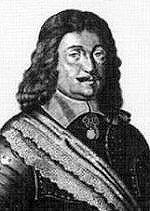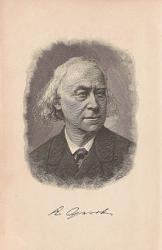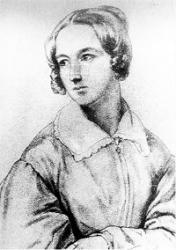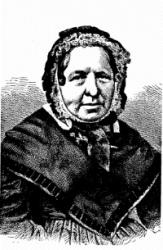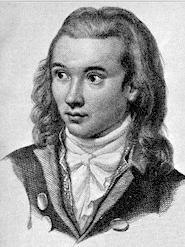
1772 - 1801 Person Name: Fr. L. v. Hardenberg Hymnal Number: 113 Author of "Gelobt sei Gott, daß Jesus lebt" in Die Glaubensharfe Pseudonym: Novalis. See also Novalis, 1772-1801
------------------------------------------------------------------------------------------------------
Hardenberg, Georg Friedrich Philipp von, was son of Baron Heinrich Ulrich Erasmus von Hardenberg, director of the Saxon Saltworks at Weissenfels. He was born May 2, 1772, at his father's estate of Widerstedt or Ober-Wiederstäd, near Eisleben. In the autumn of 1790 he entered the University of Jena, then went to Leipzig, and finally to Wittenberg. After concluding his studies, he went, in the end of 1794, to Tennstädt, near Erfurt, in order to learn administrative business under Kreisamtmann Just. In the autumn of 1797 he entered the School of Mines at Freiberg in Saxony, and in the autumn of 1799 went to Artern, at the foot of the Kyffhäuser-Berg, to be employed in the saltworks there. Soon after he began to spit blood, and while on a visit to Dresden the news of the sudden death of a younger brother, in Nov. 1800, brought on a hemorrhage which destroyed all hopes of his recovery. In January, 1801, he was removed to the house of his parents at Weissenfels, and died there March 25, 1801. (Koch, vii. 4-9; Allgemeine Deutsche Biographie, x. 562-570; Blätter für Hymnologie, 1884, 3-6, &c.)
Hardenberg's various writings appeared under the name of Novalis (apparently taken from the name of one of the family estates), which he first adopted in his Blüthenstaub, published in the Athenæum, Brunswick, 1798; and it is as Novalis that he is best known. He was one of the leaders of the Romantic School which arose in Germany in the last years of the 18th century, and of which his friends F. and A. W. Schlegel, Fouque and Tieck are the best known members. It is, however, by his hymns that he will probably best be remembered. They arose in the time of deep sorrow into which he was cast on the death of his betrothed Sophie von Kühn, when his thoughts turned to the faith of his childhood (his father and mother were Moravians, and his early education was imparted by a Moravian pastor); and when from the barren religiosity of the latter days of Illumination his soul found its strength and solace in loving surrender to the Person of our Blessed Lord. His hymns, 15 in all, are distinguished by beauty of rhythm and lyric grace. While some have been included in recent German hymn-books (e.g. Nos. ii.-iv. in the Berlin Gesang-buch, 1829, through the influence of F. Schleiermacher), yet for Church use they are too subjective, and in some cases even too sentimental. They must be regarded as beautiful and deeply spiritual poems, rather than as hymns suited for public worship. Some of them are not altogether free from Pantheistic tendencies. The Marienlieder (i.e. the hymns to the B. V. M.) were not intended by himself to be published among his hymns, but were meant to be inserted in his unfinished romance of Heinrich von Ofterdingen, as hymns of pilgrims to the shrine of the B. V. M. at Loretto in Italy. Seven of his hymns were sent, on Jan. 20, 1800, to P. Schlegel for publication in the Athenæum. They did not however appear till in the Musenalmanach für das Jahr, 1802, published at Tübingen, 1802. The rest of his hymns were published in his Schriften, Berlin, 1807. A handy little edition of his Gedichte, with a critical and biographical sketch by W. Beyschlag, appeared in 1869 (2nd ed. 1877). Since the publication of T. Carlyle's Essay on Novalis in 1829, numerous "Studies" have appeared in English and American reviews and magazines; and some of these may contain translations not noted below.
Hardenberg's hymns, all of which have been rendered into English, are as follows :—
I. Hymns in English common use:--
i. Ich sag' es jedem, das er lebt. Easter. In his Schriften, 1802, pt. ii. p. 143, in 8 st. of 4 l. Repeated in the Württemberg Gesang-buch, 1842, No. 165. Translated as :-—
I say to all men, far and near, in full, by Miss Winkworth in her Lyra Germanica, 2nd Ser., 1858, p. 40. In full in Kennedy, 1863 ; and in varying centos in America in the Dutch Reformed Hymns of the Church, 1869; Baptist Praise Book, 1871; Hymns & Songs of Praise, N. Y., 1874, &c.
Other translations are: (1) "I say to every one, He lives," by Helen Lowe, in her Zareefa, 1844, p. 166. (2) "To every one I say," by Dr. J. F. Hurst, in his translation of K. R. Hagenbach's History of the Church 18 and 19 centuries, N. Y., 1869, vol. ii. p. 283. (3) "I say to each man that He lives," by M. E. Bramston, in theDay of Rest, 1875, p. 69. (4) "He lives! He's risen from the dead," by Dr. G. Macdonald, in his Exotics, 1876, p. 22. [The hymn "He lives! He lives! let joy again," by Sir John Bowring, in J. R. Beard's Collection, 1837, No. 145, seems based on this German.]
ii. Was wär ich ohne dich gewesen. The Love of Christ. Musenalmanach, 1802, p. 189, and his Schriften, 1802, pt. ii. p. 123, in 10 st. of 8 1. Included in various German hymn-books, and is No. 1562 in the Berlin Geistliche Lieder, ed. 1863.
It is said that shortly after the death of Novalis his father was present at a Moravian service at Herrnhut during which this hymn was sung. When he asked who was the author of this wonderfully beautiful hymn, he was greatly moved on receiving the reply, "Your son." And then in a moment it became clear to him that the Christ who had been the Crown and Star of his heart ever since his youth, was also his son's Saviour and Deliverer, though he had sought and found Him by a different way.
The translations in common use are :—
1. What had I been if Thou wert not, a free translation of st. i.-iii., viii., v., by Miss Winkworth, in her Lyra Germanica, 1st Ser., 1855, p. 96. Centos from this are:—
(1) Lord! when Thou mak'st Thy presence felt (st. iii.) in the Swedenborgian Collection, 1880.
(2) Thou strong ana loving God in man (st. iv.), in Hymns of the Spirit, Boston, U.S., 1864.
(3) Thou strong and loving Son of Man (st. iv.), in H. L. Hastings's Hymnal, Boston, U.S., 1880.
2. Without Thee, Lord, what had we been, a paraphrase or transfusion in 3 st. of 8 1., by Dr. W. L. Alexander, written about 1830, but first published in the second edition, 1858, of his Selection of Hymns, No. 323.
Other translations are: (1) "What might I not have been without Thee," by Helen Lowe, in her Prophecy of Balaam, 1841, p. 216. (2) "What without Thee, would I have been," by Dr. H. Mills, 1845 (1856, p. 78). (3) "Without Thee, what were I worth being", by Dr. G. Macdonald, in Good Words, 1871, p. 846. Thence (as “Without Thee what were all my being"), in his Exotics, 1876, p. 3.
iii. Wenn alle untreu werden. Love to Christ. Musenalmanach, 1802, p. 200, and his Schriften, 1802, pt. ii. p. 136, in 4 st. of 8 1. Included in the Berlin Gesangbuch, 1829 ; the Berlin Geistliche Lieder, ed. 1863, No. 1563, &c. Translated as:—
Though all the world forsake Thee, a free translation, in 6 st. of 4 1., by J. S. Stallybrass, as No. 417 in Curwen's Sabbath Hymnbook, 1859.
Other translations are: (1) Tho' all men faith had banished," by Helen Lowe, in her Prophecy of Balaam, 1841, p. 222; and thence in Lyra Eucharistica, 1864, p. 100. (2) "Though all to Thee were faithless," by Miss Winkworth, 1855, p. 165. (3) Though all were faithless to Thee," by M. E. Bramston, in the Day of Rest, 1875, p. 68. (4) "My faith to Thee I break not," by Dr. G. Macdonald, in his Exotics, 1876, p. 15.
iv. Wenn ich Ihn nur habe. Jesus only. Musenalmanach, 1802, p. 199, and his Schriften, 1802, pt. ii. p. 134, in 5 st. of 6 1. In various recent German hymnbooks, as the Württemberg Gesang-buch, 1842, the Berlin Geistliche Lieder, ed. 1863, No. 1564, &c. Translated as:—
If I Him but have, by Dr. G. Macdonald, as No. 172 in the Manchester Sunday School Hymnbook, 1855 (see Bubier), and in his own Exotics, 1876, p. 13.
Other translations are: (1) "If I have only Him," by Helen Lowe, in her Prophecy of Balaam, 1841, p. 221, repeated in Lyra Messianica, 1864, p. 207. (2) "Oh! could my soul possess His love,” by Miss Fry, 1845, p. 114. (3) “If I only have Thee,” by Dr. G. W. Bethune, in his Lays of Love and Faith, 1847, p. 139. (4) "If only He is mine," by Miss Borthwick, in Hymns from the Land of Luther, 1855, p. 54. (5) "If I have Christ, and Christ be mine," by Dr. G. Walker, 1860, p. 52. (6) “If I trust in God alone," by Frederica M. Rowan, in her Meditations on Death and Eternity, 1862, p. 88.
II. Hymns not in English common use: --
v. Es giebt so bange Zeiten. The Unchanging. Schriften, 1802, pt. ii. p. 145, in 7 st. The translations are: (1) "How dark the seasons lour," by Helen Lowe, in her Zareefa, 1844, p. 164. (2) “There are dark hours of sadness," by Madame L. Davésiés de Pontès, in her Poets and Poetry of Germany, 1858, ii. p. 408. (3) “There be such dreary seasons," by M. E. Bramston, in the Day of Rest, 1875, p. 55. (4) "The times are all so wretched," by Dr. G. Macdonald, 1876, p. 24.
vi. Fern im Osten wird es helle. Christmas. Musenalmanach, 1802, p. 193, and his Schriften, 1802, pt. ii. p. 128, in 6 st. The translations are: (1) "Afar the Eastern sky is glowing," by Helen Lowe, in her Prophecy of Balaam, 1841, p. 218, and Lyra Messianica, 1864, p. 87. (2) "Dawn, far Eastward on the mountain," by Dr. G. Macdonald, in Good Words, 1872, p. 216, and his Exotics, 1876, p. 7.
vii. Ich sehe dich in tausend Bildern. B. Y. M. Schriften, 1802, pt. ii. p. 157, in 8 1. Translated as: (1) "In many a form I see thee oft," by Helen Lowe, in her Prophecy of Balaam, 1841, p. 229. (2) "In countless pictures I behold thee," by Dr. G. Macdonald, 1876, p. 36.
viii. Ich weiss nicht was ich suchen könnte, Desire for Christ. Schriften, 1802, pt. ii. p. 147, in 12 st. The translations are: (1) "I know not what I could desire," by Helen Lowe, in her Prophecy of Balaam, 1841, p. 223, and Lyra Mystica, 1864, p. 218. (2) "How could I wish a greater treasure," by Dr. H. Mills, 1845 (1856, p. 72). (3) "I know not one hope left to draw me," by Dr. G. Macdonald, 1876, p. 26. (4) "What better good could e'er befall me," by R. Massie, in the Day of Rest, 1878, p. ill. (5) "I know not what I more should long for," by F. W. Young, in the Christian Monthly, 1880, p. 559.
ix. Unter tausend frohen Stunden. Communion with God. Musenalmanach, 1802, p. 197, and his Schriften, 1802, pt. ii. p. 132, in 4 st. The translations are: (1) "Of all the golden hours whose light," by Helen Lowe, in her Prophecy of Balaam, 1841, p. 220. (2) "All my world was struck with storm" (st. ii.), by M. E. Bramston, in the Day of Rest, 1875, p. 55. (3) "Of a thousand hours me meeting," by Dr. G. Macdonald, 1876, p. 11.
x. Weinen muss ich, immer weinen. Passiontide. Schriften, 1802, pt. ii. p. 141, in 7 st. Translated as, "Weep I must—-my heart runs over," by Dr. G. Macdonald, 1876, p. 20.
xi. Wenige wissen das Geheimniss der Liebe. Holy Communion. Musenalmanach, 1802, p. 202, and Schriften, 1802, pt. ii. p. 138, in 2 stanzas. Translated as, "Few understand the mystery of love," by Dr. G. Macdonald, 1876, p. 17.
xii. Wenn in bangen, trüben Stunden . In sorrow. Schriften , 1802, pt. ii. p. 153, in 2 st. The translations are: (1) "When in hours of pain and anguish," by Madame L. Davésiés de Pontès, in her Poets and Poetry of Germany, 1858, ii. p. 407. (2) "When in dreary, mournful hours," by Lady John Manners, in her Gems of German Poetry, 1865, p. 14. (3) "When in hours of fear and failing," by Dr. G. Macdonald, 1876, p. 32.
xiii. Wer einmal, Mutter dich erblickt. B. V. M. Schriften, 1802, pt. ii. p. 154, in 8 st. Translated as, "Who once hath seen thee, mother fair," by Dr. G. Macdonald, 1876, p. 33.
xiv. Wer einsam sitzt in seiner Eanuner. Christ the Consoler. Musenalmanach, 1802, p. 195, and his Schriften, 1802, pt. ii. p. 130, in 9 st. Translated as, "Who in his chamber sitteth lonely," by Dr. G. Macdonald, in Good Words, 1872, p. 234, and his Exotics, 1876, p. 9.
xv. Wo bleibst du, Trost der ganzen Welt. Advent . Schriften, 1802, pt. ii. p. 150, in 12 st. Translated as, "Earth's Consolation, why so slow," by Dr. G. Macdonald, 1876, p. 29.
Besides the above he had previously published a series of poems entitled "Hymnen an die Nacht" in the Athenæum, a magazine edited by A. W. Schlegel and F. Schlegel, where they appear in vol. iii., pt. ii., pp. 188-204, Berlin, 1800. They are a wonderful picture of the "night" of sorrow into which he was plunged at the death of his betrothed on March 19, 1797. There are five poems "in prose, with interspersed verse, the sixth being in verse. The longer poems in verse-form are:—
1. Das furchtbar zu den frohen Tischen trat.
2. Geboben ist der Stein.
3. Hinüber wall'ich.
4. Hinuntcr in der Erde Schoos.
There is a complete translation by Henry Morley in his Dream of the Lilybell, &c, London, 1845. No. 2 has also been translated by Dr. G. Macdonald in his Threefold Cord, 1883, p. 256; and No. 4 by Helen Lowe in her Prophecy of Balaam, 1841, p. 226 (Lyra Mystica, 1864, p. 220).
[Rev. James Mearns, M.A.]
--John Julian, Dictionary of Hymnology (1907)
See Novalis, 1772-1801
Georg Friedrich Philipp von Hardenberg


 My Starred Hymns
My Starred Hymns